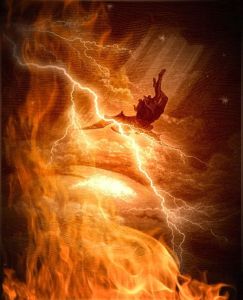The Parable of the Talents in Matthew is the Parable of the Minas in Luke, and it’s worth noting some important differences. A talent is worth more than $1000; a mina was equivalent to about three month’s wages–still a significant sum, but not in the high-roller league. Both Matthew and Luke place this parable during the week of the crucifixion, meaning it was one of the last Jesus ever told. Luke explains why he told it: because “the people thought that the kingdom of God was going to appear at once.”
Luke also adds this context: the master in the story was going away to receive a kingdom. And his would-be subjects had already rejected him by sending a delegation ahead to complain, “We do not want this man to be our king.” So the servants are entrusted with a not-inconsiderable sum of money to invest in a society that’s already hostile to them.
Matthew’s use of talents may signify the incalculable value of what we’re given to invest; Luke’s mention of minas could suggest our human limits of time and resources. Both apply, but we should also consider the expectant audience listening to this now-familiar story for the first time. They thought the kingdom was going to appear.
No, he’s telling them; the kingdom must be built.

I will build my church. And my church will build the kingdom. Not on her own, not without my name or the Holy Spirit’s power or the Father’s providence.
But the kingdom is ours to build.
I will build my church. And my church will built the kingdom.
I forget that. I think of Jesus coming with his angels to judge the living and the dead and to me that’s the kingdom. It will APPEAR at the sound of a trumpet. Now, with the world in such disarray, would be a great time! But Jesus’ coming is when the kingdom will be made visible and apparent; it’s being built right now. My business, every day, is kingdom business.
That business is easy to lose track of because it has so many facets: making a living, raising a family, performing acts of charity, serving a local church–all in a culture that continually proclaims, “We do not want this man to be our king.” That’s always been the case, in churchy, straightlaced times as well as in degenerate time. The world does not want Christ as king, has never wanted Christ as king, and will never want Christ as king.
So we build his kingdom. I don’t know why he does it this way, why he doesn’t just bring it. Bring it! may be what we mean when we say, “Come, Lord Jesus.” But he’s not going to bring it, he’s going to wrap it up as a gift to present to his Father. Or, to switch metaphors, he’s coming to place a bridal crown on her head and take her hand to lead her to the wedding feast. By then the kingdom will be built, the rightful king restored, the rebellious subjects subjugated. (For don’t forget the conclusion of the story: “But those enemies of mind, who did not want me as king . . .”)
What’s my part? Where do I build? My little section of this magnificent project seems small and insignificant, but his eyes are on it, and a cloud of witnesses are cheering me on.




